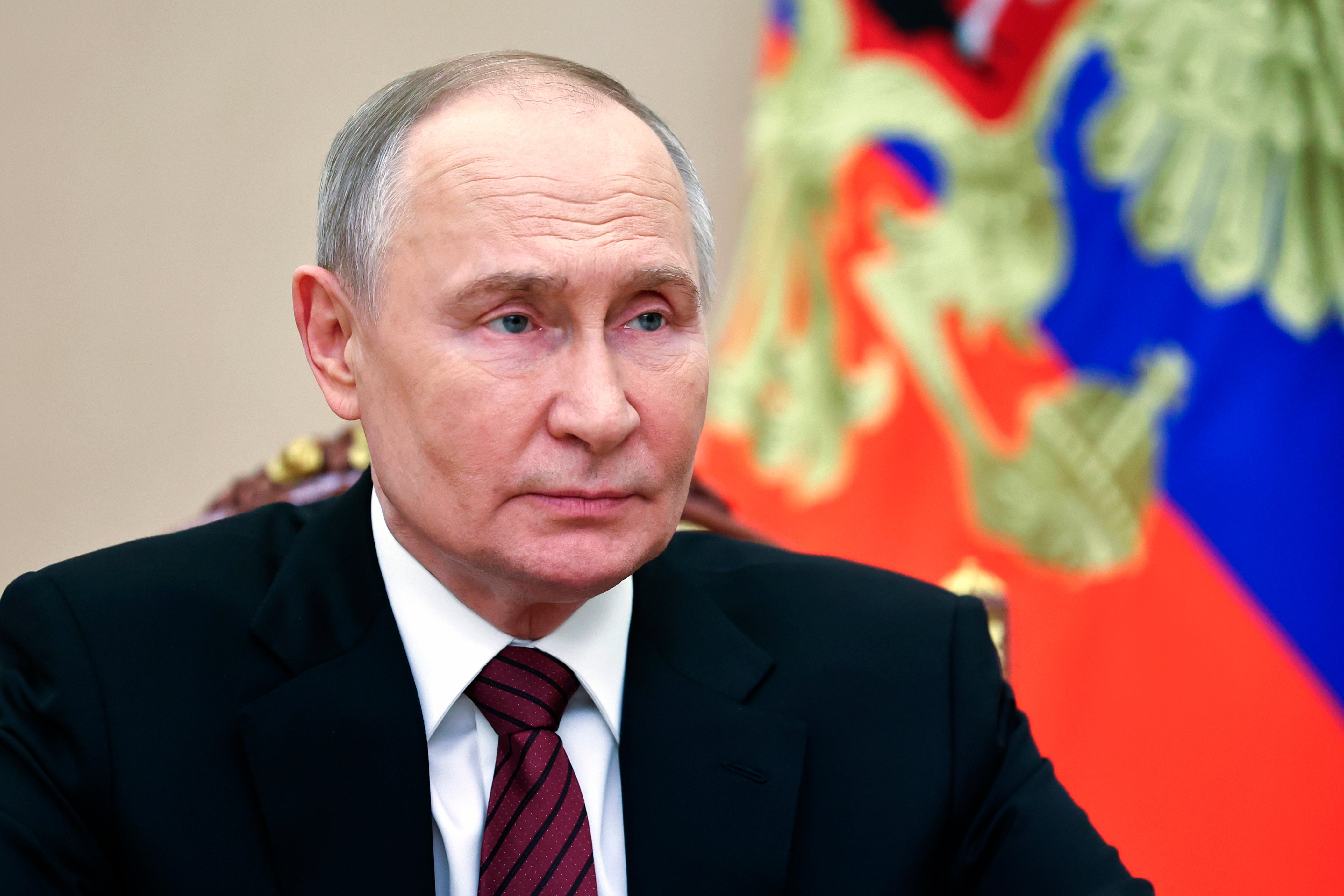Putin has ruled Russia for 25 years – but what has he really got to show for it?
Crisis has aided the Russian strongman’s regime stability far more than any index of economic success, writes Mark Almond


When Boris Yeltsin suddenly resigned as Russia’s first post-communist president on New Year’s Eve, 1999, his country seemed to be spiralling downhill into economic and political disintegration. Few gave his largely unknown successor as acting president much chance of reversing the economic implosion or remaining in office for long.
The then prime minister Vladimir Putin’s media operation had already begun to portray the ex-KGB operative in stark contrast to the moribund Yeltsin as an action man. That same year the second Chechen war on the country’s southern border raged. Twenty-five years later, Vladimir Putin is still in the Kremlin but Russia is again in the grip of war on its post-Soviet periphery after last week’s downing of an airliner over Chechen airspace.
Add to the tension that Putin’s Russia has been engaged in a covert war against Ukraine since 2014, which he had turned into a full-scale invasion by early 2022 – a conflict that remains at an impasse today. As with his earlier war against Chechnya, Putin’s obduracy turned an opening military fiasco into a brutal war of attrition which Russia’s resources could win at a huge price.
But Putin’s rise over the years owed more to bureaucratic infighting skills than any dark espionage arts, or even the judo skills which he would at one time display in front of loyal cameras.
Born in post-war Leningrad amid the grim legacy of the Nazi siege, the young Vladimir Putin learnt survival arts more appropriate to the chaotic post-Soviet dog-eat-dog society of the 1990s than the shining utopian future promoted by communist propaganda.
Westerners imbued with the myth of the KGB as anti-James Bond supervillains overlook that it was Putin’s relationship with his law professor at university rather than his time in a dingy office in Dresden that launched his meteoric rise.
Anatoly Sobchak was the classic “licensed” dissident in late Soviet times. A non-Communist Party member permitted to whisper subversive comments in return for quietly cooperating with the KGB against really awkward customers, Sobchak was in a position to present himself as a new broom once Mikhail Gorbachev permitted real elections after 1989.
On returning from East Germany, Putin left the KGB and became one of Sobchak’s lieutenants, soon in the key role of managing the new mayor of Leningrad’s vast city property portfolio. This job brought the new civic bureaucrat into contact with the emerging post-communism new rich.
People were inclined to be dismissive of Putin in the 1990s, as they had Stalin 70 years before. When a comrade derided Stalin as a “mediocrity”, Trotsky agreed, but added, “Not a non-entity.” He saw that Putin’s great predecessor actually was a kind of living embodiment of huge sections of the new Soviet society.
It was the West’s failure to grasp that Putin represented swathes of Russians in the 1990s that gave him traction in Russian politics. Putin’s ability to serve Yeltsin and his cronies through that decade led them to the fatal error of choosing him as an easily manipulated successor as president.

Putin’s pardoning of Yeltsin for any misdeeds while in office was followed by a ruthless suppression of the oligarchs. He showed state power trumped money power. Military power ground down the Chechen rebels. Oil and gas prices soared as George W Bush’s war on terrorism benefited Putin’s economy. Yet years of economic growth and peace at home did not stabilise Putin’s regime.
In 2011, mass protests shook Moscow. The fact that these took place in a time of peace and relative plenty taught Putin a lesson. Crisis made for regime stability far more than any index of economic success. If people felt secure in their everyday lives, they could get above themselves.
Like so many past Russian rulers, Putin is well aware that the relaxation that comes with peace can promote political dissent.
Putin’s studied indifference to the fate of the crew of the sunken submarine Kursk in 2003 and their families’ trauma as the drama played out below the Barents Sea was one episode of his Stalin-like view of mass death as a matter of statistics.
Westerners thought the misfiring of the Ukraine war would undermine Putin. However, rather as pro-Assad media used to show a parade of Western leaders who had demanded his fall and yet had been and gone while he ruled on, Putin has outlived many of his Western critics. Yet he must also be haunted by Assad’s sudden downfall.
Will his power crumble so quickly? Back in July 2023, when his former-chef-turned-warlord Yevgeny Prigozhin rebelled against him, no one resisted the march from Rostov in the south to the gates of Moscow. Then Prigozhin did a deal with Putin – before his plane crashed with him and his fellow mercenary bosses.
Just as after he triumphed over Hitler in 1945, Stalin did not relax his regime but intensified internal repression, Putin today sees military victory as less essential to his survival in power than continuing international tension. But even as shrewd a political operator and as skilled a propagandist as Vladimir Putin knows, at 72 years of age, that the clock is ticking against him. Stalin died in his bed. Will Vladimir Putin?
Back in 1999, Putin had taken charge of the attempt to force rebellious Chechnya on its southern border back under the Kremlin’s control. Only a few days ago, as collateral damage of today’s Ukraine conflict, the fatal crippling of an Azeri airliner over Chechen airspace by Russia’s trigger-happy air defences brought home how far – a quarter of a century later – Putin’s reign has been so far bookended by war.
Join our commenting forum
Join thought-provoking conversations, follow other Independent readers and see their replies
Comments
Bookmark popover
Removed from bookmarks